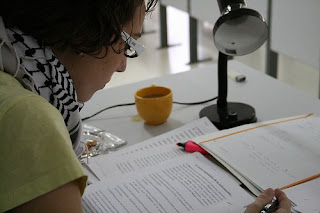SMARTNESS METHODOLOGY FOR EXAMINATIONS
During the month of exams all over India and exams do
matter! So take an intelligent look of your own situation Vis-à-vis
examinations requirements. Don’t just go all out –day & night working like
a short sighted mediocre. Develop intelligence to meet the challenges of exams.
I do feel that every examinations be it State Universities, State Technical
Boards, IES,AIEEE,IIT-JEE,GATE, have predictable patterns look for that
patterns & develop your preparedness around that pattern.
PATTERN ANALYSIS:-
Let’s become clear what I mean by pattern. I would like to
take my first example from the field were .I am most comfortable with IES, AIEEE, IIT-JEE, GATE. What is the
new pattern that is most likely to be? But this analysis could be an useful
hint to any other examination be it be State Universities, State Technical
Boards, IES, AIEEE, IIT-JEE, GATE. Have a look at the following analysis. Types
of questions in the exams certainly would be objective which would be based on
subject knowledge with occasional add on knowledge through passage
comprehensions, assertions & reasoning, match the columns & many more.
REQUIRED SKILLS:-
Through knowledge of subjects, ability to solve numerical
based mainly on calculus, algebra, trigonometry and many more relevant
subjects. Ability to solve with speed & accuracy is very critical
requirement smart management of your attack on problems in examination hall is
equally important –How do you open your attack? One easy one first & then
difficult one later or vice versa. Your smartness in handling the stuck up
questions yet not letting yourself down in your momentum of attack on remaining
part of the paper & then return to left over portion etc. are some of the
factors where you have clear and settled approach.
FIX YOUR METHODS:-
You must fix your method as quickly & intelligently as
possible. Become very alert to your exam needs. But remain relaxed. Don’t come
under stress as that won’t help you. In any case you are going to perform to
your fullest possibility only when you are not under stress. Take care of your
wasteful habits. You can’t change & yet remain the same, though this is
what most people want. All of us desire improvement & many of us might be
knowing also what to change – But the act of changing our selves is difficult
that most of us give up very soon. Change means that we have to say “no” to
some of our own action which ostensibly give us pleasure. Be clear .Can you
chuck them off from your self improvement ? If yes then do that now without any
expectations of praise for that. You would go up in your own eyes 7 that’s what
which truly would & should matter the most.
TIME MANAGEMENT:-
Manage your time well let no circumstances or individual
waste your time. Some of the facts you would do well to take not in this regard
should be the following point:-
- Try to divide your time into blocks of 1 hour.
To begin with spend 50 minutes studying followed by a 10 minute break.
- You may find that you can increase the time you
spend studying. After a while when your concentration increases.
- Always plan for a lunch break & some sort of
physical recreation. You can’t work if you are tired or mentally bored.
- To begin with, allocate harder tasks for the
time when you are at your most productive. Some people work best in the morning
others work best in the evening. You decide when.
TIME MANAGEMENT FOR REVISION
- Make a revision time table – It is not a
difficult task use the time table to structure your revision.
- Fill in your own study time in the spaces along
the time table.
- Alternatively make your own time table, use a
diary or a wall chart that is specific to you.
- Use the time table provided as a guide if you
don’t know how to construct one.
- Some people like to study early in the day,
others prefer to study later on.
SOME IMPORTANT TEKK MANTRA’S FOR EXAM PREPARATION
- Do try to study at least 12-14 hours in 24
hours. As before exam last minute push matters a lot.
- Schedule breaks in your working day for food,
relaxation& exercise, but not all at once. Too much work can be as
unproductive as too little work.
- A good way is to start is to work 50 minute then
have 10 minute breaks every hour.
- Be realistic- Don’t plan a schedule you can’t.
- Be disciplined- Stick to what you say you will
do.






















